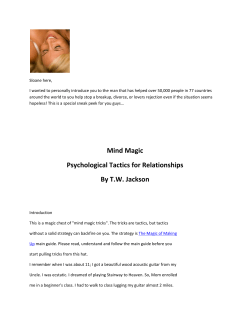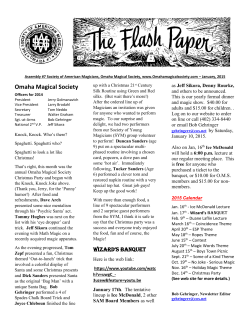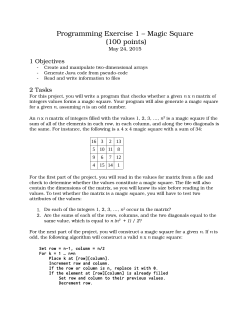
Live in Community? Can We Afford Not To?
HIL/\RY kIUC Magicians and guests interrupt lunch on :he front porch for a group photo. Ca B Y HILARY HUG AND ROBIN BAYER Can we afford to live in community? Can we afford n o t to? Can w e afford to spend more money and work more hours rhan are required for simple nlaterial com fort? Can we afford ro make unnecessary demands upon other people or on the res[ o f the environment? Or to forgo the insights and support of caring friends who know us as only those who live with us can! At Magic, a residential service -learning community in Palo Alto, California, we live comfortably by North American stan dards, and luxuriously by global sran dards. W e do this on less than half rhe averzge per capita income in our area, and with less than half the per capita pollution and resource depletion o f a n average us resident. We earn our livelihoods by studying and teaching how people can learn to apply ecological principles to further the common good, and enjoy round the-clock access to each other‘s thoughrful counsel. W e can afford all t h i s by living in community. Fall 2002 rd Not To? “Homeless Population Hits All-time High.” “Housing Shortage Worsens.” “ H o m e Ownership Beyond Reach.” You’ve seen the headlines. As more and more people crowd o n t o the Earth, resources sufficient to house every individual or couple in a suburban home are simply unavailable. William Rees o f the T ILnlversiry of British Columbia estimates that we would require on the order o f ten more Earths to support all six-plus billion o f u s in the current American lifestyle. Sharing housing can help improve personal well-being, reduce social inequality, and protect environmental quality. Renting or purchasing a four-bedroom home or apartment i s less than four times as expensive as renting or purchasing four comparable one-bedroom dwellings. Pro1,iding a kitchen and bathroom for every bedroom increases environmental impacts 2nd labor burdens as well. Consider, for example, effects o f seven adult and two three year -old residents sharing one bathroom in our community, o f i e n with one or more overnight guests, .;nd with as many as rwo dozen daytime tisirors. Homebuilding costs in our locale x e S2iO -300 per square foot. Even 3 modest barhroom can entail a $15,000 30,000 investment. The average US household contains benveen nvo and three occupants, and between one and two bathrooms. Because at Magic we lay claim to fewer than “our share” o f bathrooms -about one tenrh o f 3 barhroom per person instead o f one half-we’ve avoided $1 00,000 o f capital With that amount we can generate a n inflation -adjusted $4,000 of annual income without drawing down principal! W e also reap savings by cleaning one, rather than five bathrooms. Cleaning each o f four bathrooms for one to two hours per week requires 200-400 hours per year. At current hourly wages in our area, that labor i s worth at least another $4,000 expenditures. annually. With the global average wage less than a dollar an hour and the average work week more than fifty hours, the $8,000 per year reduction in capital and mainte nance expenditures we achieve by sharing 3. bathroom i s enough to support three people in full-time public service! To make floor, walls, pipes. wires, mirror. tile. toilet, sink, and so on for a barh- room, we cut trees, m i n e ore, pump 011, and more. W e burden the environment easily share the sink n I fact, the Magic shower and toilet are each in use less than with everything from greenhouse gases to toxic waste. To wrest the ron o f materials two o f every twenty -four hours Surprising as i t may seem, we’re com ing to view loss o f privacy as a henefit. As each o f u s endured or imposed the unnec essxy inconvenience ofwaiting, we’ve had impetus to questlon why we extlact and pay that price. Sitting on the toilet we’ve asked, “Why do I think o f using the toil e t as something to hide?” Standing i n the shower we wonder, “Why do I con ceal my naked self?’’ Increasingly, w e see desire for privacy as a cue that we’re being dishon - in a small bdthroom and i t s fixtures from thc Earth, humans process ten 01 more tons o f r a w materials, most o f which we turn to waste. By sharing a bathloom n i our community w e reduce our waste forty tons! by es t-t 11 a t dozen diners engage n i lively conversation about habitat stewardship fieldwork they just completed. n I the kitchen two latecomers serve themselves salad f r o m a counter laden with fresh organic prociucc and breads from local bakeries while two others take up pnsta, tomato sauce, and vegetables From pots s t e a m i n g o n t h e P we’re laboring to maintain 2 distinction between the person - ae w e presenr to oth - ers and the persons we are. We’re learn ing t o distinguish privacy, by which wc seek to prevent others from knowing us, from so 1i t 11 de, by which we aim t o know ourselves bet- towards purchasing our home, and we’ve loaned m o n e y and provided t e n a n t s below - market - rate lease - option agree ments to assist others n i purchasing theirs. We’ve supported ourselves and others n i work aimed a t furthering common good. And we’ve slept, danced, exercised, read, sung, and cared for children with l i f e energy not spenr in building and maintaining bathrooms or working to earn money to pay others to do these tasks.. What do we “give u p for these savings?Mostly privacy and convenience. I o the extent that we’rc willing to see and be seen while bathing or using the toilet, w e surrender only privacy, because w e rarely want t h e toilet or shower ar exactly t h e s a m e t i m e as s o m e o n e else, and we c:m to share. It’s dinnertime at Magic. Food service affords another excellcnt example o f how con1rnunity living can yield both lower costs a 1 1 d 11ight.r quality o f life. We’vc only onc stove a r d two refrigerators to purchase and d e a n . O n e person shops for all. Because w e use rela- tively large volumes o f food quickly, we can t a k e fdler ~dv,~nrage o f “speciala” and energy and o t h e r conurne marl<ed -clown bruised nnct c l a n - r e s o i ~ r e sw e o n c e aged i t e m s heforc h e y spoil. Wc ptIrcI1;w beans, grdi11, ~ n sdo on in IILIII<From ;I wholesaler who delivers t h e m co our doo~; One or two community members, often aided by guests, cook and clean up each night. The rest enjoy a catered m e a l at homc with friends. Drdwing on our individual social circles w e provide ench other :I r i c h diversity o f visitors with whotu we share ideas and feelings. In a shared kitchen as in a shared bachroom, w e find thorns as well as roses. Our cooks burn an entrCe or serve dinner late. Someone breaks t h e stove by using too much force and too little thought, and al suffer. As we experience these events together, we b e c o m e partners n i shouldering responsibility, refraining from blame, accepting self and others, and thinlting prospectively about how we can live bett e r and contribute to othel -s’ doing so. Wc I W e ’ v e applied “bathroom” savings t h e other, posing questions, climbing o n laps, and sampling fare from those willing ter, and to redirecc wasted pursuing t h e Heather coaches /en and H i in dental hygiene. stove. Children r o m l fro111one group to former t o e n s u r e that a i l o f u s have adequate access to the latter. Such shifts n i c o n x i o u s n e s s and behavior, in w h c h we move from lack o f awareness, to Inslght, to tlansformative action, are a benefit o f community living that most people see dimly, i f at all, and that we at Magic ponder how to value accurately. What is It worth to be more relaxed, open, and honest! To be more effective and satisfied as parent, worl<er, or frlend! To avoid dines and injury? To simply feel better? A half dozen friends eat supper on Magic’s front porch after practicing hatha yoga together in a nearby park. Persim mons are ripening near the porch, and ripe plums a n d apricots Fall from other trces neal-by. In the back yard another h a l f become enriched . In almost any aspeci - o f life at Magic a keen observer can see additional bene f i t s o f community. Seven adults in the US each living alone, typically pay for seven phone l i n e s . They either answer their pholles, l e t a machine do it, or m i s s t h e i r cals. At Magic we share two lines. W e d e calls for each other, serving callers and called, and becoming better acquainted with each other’s family and friends in the process. For being each other’s personal assistants, each enjoys the services o f sevel-al personal assistants. A high-speed I n t e r n e t connection cost5 less and is Faster and more reliable than seven dial-ups. Our single utility bi1 I is a fraction o f what w e would pay if each o f us 1 ived alone. We’ve one wash e r and one dryer to purchase and maintain. We clean a n d repair less than two thousand square f e e t of floor space, including workspace, m d w e scrvicc onc, rather than two or five or seven, o f every - thing from an ax to a zoom lens. Our pooled tools, books, vehicles, musical instruments, recreational equipment, etc. are so extensive that friends and neighbors tegula~lyborrow ft-om LIS. T h e list goes on and on. At Magic we consider the psychologi cal benefits o f community living to be even greater than the material benefits. Many people have difficulty understand I ng this, because they’vc only experienced relatively “unintentional” c o m m mi ty. Most of LI S grow up with parents a d siblings acquired by chance. We live in dorms, barracks, fraternities, or sororities where w e share only transient or shallow purpose with those around us. We form houscholds o f economic convellience by necessity, rather than by choice. We bring to all o f t h e above settings much o f t h e consciousness o f “take as much as you can, and give only what you must” which i s a guiding principle for participation in the commercial exchange economy in which we are increasingly immersed. We’re shaping a community n i which each o f u s can give mote, be freer in giving, and in an apparent paradox, get more out of life even while demanding less of each other and the world around us. With single -parent and single -occu pant households among the fastest grow ing censws categories in the US. we are losing a critical context for knowing a n d Summer 2002 Frank!in, a neighbor, returns Magic belt sander to Chns. b e i n g known. Who can be surprised that SI) many people f e e l lonely, disaffected, alienated, afraid, and overwhelmed? Who can doubt t h a t community can play a role 117 both preventing and curing anomie? By sharing tears and laughter, concerns and ttiumphs in O U T community, w e q>pre&te seif and others more tlliiy and deeply. We discern mure clearly how each o f us feels and projects, and w e learn t o allay fear with love. We become mote adept a t giving and receiving love at home and in other settings. D o we sometimes find t h i s difficult? Of course. When David failed to secure the proper building permit, he wished more than once that i t were his own lit- i n s t l u m c n t s . I’euplc ctancc ~ ! ~ I I Iin C, pairs, and i n groups. Tllrre’s an easy flow to the scene. Commurlity living is cheap fun. A night in a club for sevell adults is JI least a 11LIIIcIret1-d 01 IXI- L L ndc r t:11< i 116. I t c.:~11 e n t i 1 travel, cbiltlcnre, ticltcts, possibility that mllsic, ;~ndtllc fooocl, or o t h e r patrons may be lirtle to our lil<ing. When we party a t Magic, we’re with^ out any o f these costs and concerns, and we easily includt: a dozen or s o ncighbors and friends in our fun. With ;1 weel+ darlcc p a r t y we save $5,000 - I0,OOO ;I yent. ancl givc mucll o r more value to OUI- guests. this Though co 011r 111m LI 11 i t y tle secret, rather members t h a n a “public” f a i l u t r . I s that many others are seeking to rehu- r e a l l y what he wants? To carry manize the burden o f pretending- t o be a person who’s above malting s u c h errors? I n the end h e thought he gained more by coming clean. Our living and dining rooms are dark, and we’ve moved our furniture onto the porch. M u s i c fills the air with Paul Simon on the stereo, Jeffrey on keyboard, Kent on guitar, L i z a n d Martin on drums, and kids claclting and jingling assorted rhythm merce, and com - the money economy r e m a i n s a realm in which crying needs go unfulfilled and multitudes are d i s a d vantaged. We perceive t h a t by giving more rreely to each other, we begin to remedy these ills. Over the past several days, Dave fixed Hilary’s bike, Hilary cared for Robin’s daughrers, Kobin paid Daniel’s bills a n d bal anced his c h ecltboo I<, a 11d I)a 11i eI took phone messages for I h c . T h e s e 57 Dave repairs Hilary’s bicycle. Hilary feeds twins for Robin. Daniel takes Dave’s calls. Robin pays Daniel’s bills. -s Gift Economy at Magic be valued a t qwte different races in rhe marketplace. People concerned wirh keeping track o f such discrepancies devote a n enormous amount services are likely to of l i f e energy to doing so-life energy unavailable to render other services. Robert Axelrod, a biologist who has srudied cooperation, has observed that humans and other animals are more likely to cooperate when we expect to interact in the future. By living togeth er we ensure such future interaction. As w e become more aware o f our common humanity, we l o o k for ways to give more, and t a k e less, borh within Magic and without. W e live our days remembering that the less resources we channel into keeping track o f who gets what, t h e more we have available KO increase what everyone gets. We think o f money as “soft” guns, a way to command others in which underlying power relationships are made less visible. W h e n w e enlarge t h e money -free realm o f our lives, we strip away camou flage. We s c e more accurarely whar w e give and whar w e rake, and from whom. We reduce our reliance upon those who ask thar we compromise our commitment ro common good, and upon people all over the world who compromise theirs to serve u s because they fear t h e conse quences o f refusing to do so. As we grow and diversify our commu nity, we create additional opportunities for generating and receiving goods and Community living is cheap fun. services within it. W e can shape interac - [ion wirh each other and with people elsewhere to reflect the value we place upon consensuality and freedom. This restruc curing o f our social relationships i s an essential element of what we consider our spirirual pach. itual fulfillmenr, we feel x Magic secure food, shelter, commun cation, recrearion, and personal and spir- we’ve only enriching, even in i t s most difficult moments. As we look a t current trends in population, resource use, environrnenral degradation, cultural evolution, and individual well-being, we see intentional community a a viable, perhaps neces sary strategy to slow our collective impoverishmenr, and to maybe even someday realize age-old, near universal aspirations to prosperiry and well-being for all. R H a lir y Hug nnd Robin Bayen who hold degrees fiom Stanfrd n i Humnn Biology and Civil Engineering respectiveb, have each lived ut M‘zgic for more than a decude, where they teach how people can apply ecnlogy t o become healther, more coopemtive,and berter stmards of the ennironment. They are co-mothering Robin ? three-year-oId twin girls. Although we’ve couched upon how we that begun ro describe the benefits we reap by living cogether. W e find t h e experience o f i n t e n t i o n a1 co m rnuni t y iIn 111 e n s e 1 y ABOUT MAGIC M agic. founded in 1972 and incorporated as a 501(c)(3) non-profit in 1979, demonstrates how people may live better by learning to see self, surroundings, and interactions between these more accurately. Magic program participants apply methods and principles o f ecology to: (I) clarify values; (2) improve health; (3) increase coopecition; and (4) steward the environment. Our activities include lectures and seminars about the nature o f value; life-planning workshops; swim, run, and hatha yoga instruction; youth mentoring; mediation; community organizing; planting and caring for trees and other vegetation; habitat stewardship; water and land resource planning and advocacy; and publishing. Central to Magic i s a residential education program. Individuals in this learning community shoulder primacy responsibility for operating Magic and for conducting t s i public service activities. At home and a t work w e aim to model how ecological analysis and dedication to common interests o f humankind are a foundation for living well. Magic is a vehicle for giving. Each year hundreds o f donors contribute attention, advocacy, labor, material, and money. With this generous support, we are able to adjust, and sometimes entirely waive, fees for Magic services to make them more widely available. W e are currently gathering resources for two major initiatives: (I) expand and diversiFy teaching and publishing about an ecological ap- proach to value; and (2) establish additional research and teaching facilities in Palo Alto and in settings where w e may develop our model o f ecology - based service -learning community while living closer to nature. If you perceive that you or someone you know may benefit by receiving Magic services, or by giving that others may enjoy them, we’ll welcome communication from you. Please visit http://www.ecomagic.org; e-mail magic@ecomagic.org; phone 650.323.7333; or write Magic, Box 15894, Stanford, CA 94309. MAGIC
© Copyright 2025









